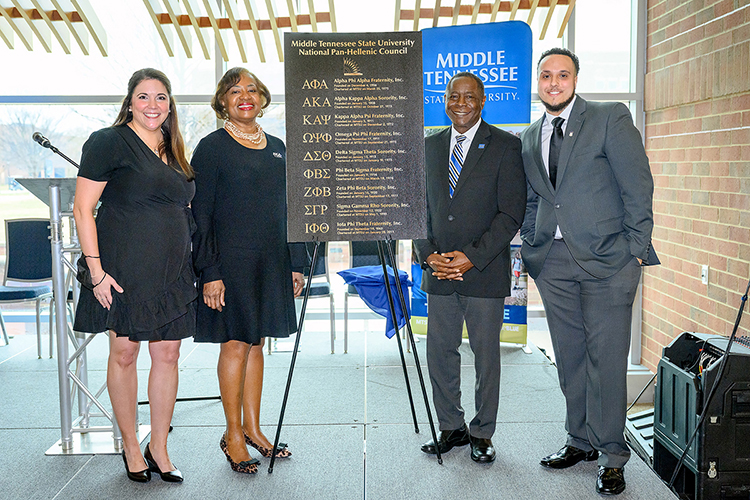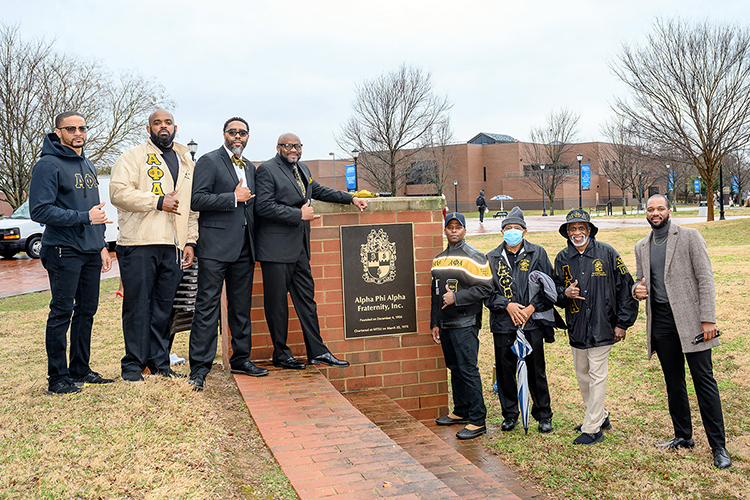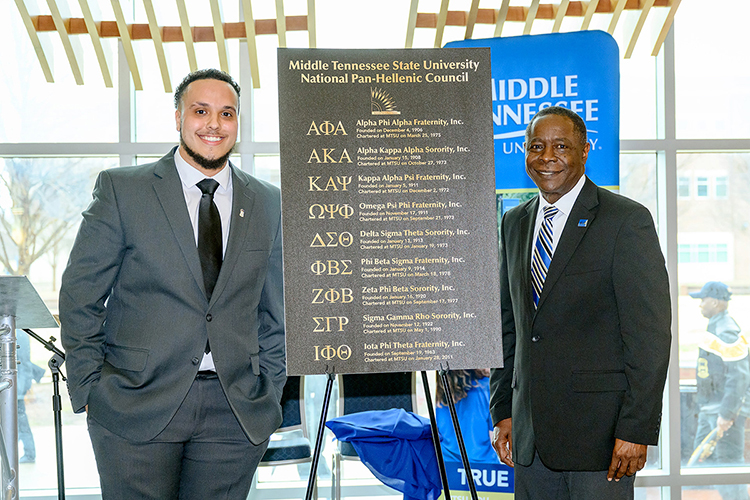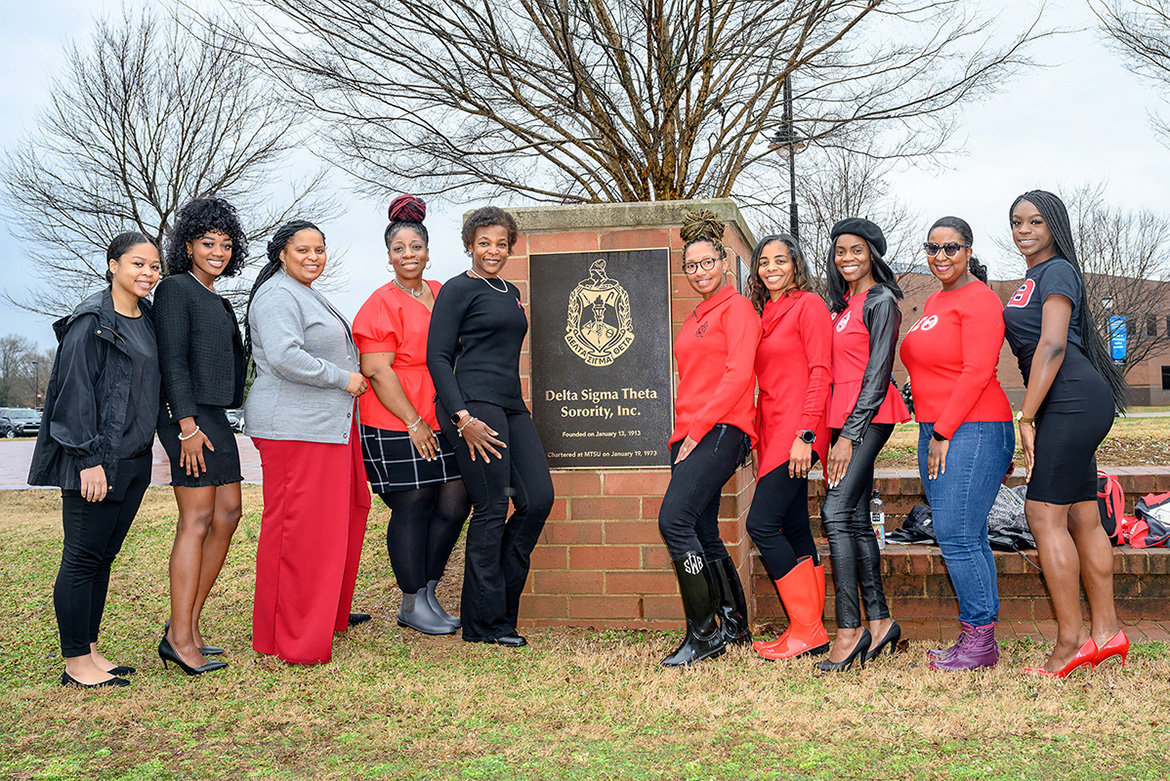Bronze plaques representing renowned student organizations are in place at Middle Tennessee State University to celebrate the institution’s 50-year relationship with the National Pan-Hellenic Council.
Before an audience of fraternity and sorority members clad in their groups’ respective colors, university and group officials dedicated the plaques Feb. 17 in a ceremony at the Student Union.
The member organizations represented at MTSU are the sororities of Alpha Kappa Alpha, Delta Sigma Theta, Sigma Gamma Rho and Zeta Phi Beta and the fraternities of Kappa Alpha Psi, Omega Psi Phi and Phi Beta Sigma.
These groups, along with fraternities Alpha Phi Alpha and Iota Phi Theta, represent the “Divine 9” nationally recognized historically Black fraternities and sororities. In December, 10 plaques measuring 2 feet by 3 feet each were installed on the Student Union Commons, one for each of the “Divine 9” and the tenth to represent the NPHC on campus.

MTSU personnel and alumni attended a Feb. 17 dedication of 10 bronze plaques located in the Student Union Commons recognizing National Pan-Hellenic Council fraternities and sororities and the council’s 50-year relationship with the university. Standing with a prototype of the omnibus plaque are, from left, Leslie Merritt, director of Fraternity and Sorority Life; the Rev. Deborah Smith Owens, Eta Psi Chapter of Alpha Kappa Alpha Sorority Inc.; MTSU President Sidney A. McPhee; and Jalen Everett, president of the MTSU National Pan-Hellenic Council and member of Phi Beta Sigma. (MTSU photo by J. Intintoli)
MTSU President Sidney A. McPhee, a member of Phi Beta Sigma, celebrated the Greek groups’ legacy of student leadership and cited ways in which they have contributed to campus life over the years.
“Some examples include donating needed items and funds to local and national causes, educating MTSU students on societal topics to provide cultural awareness, community service projects to support Murfreesboro and Rutherford County, sponsoring scholarships to help and provide financial assistance to students and many other very worthy projects,” McPhee said.
The Rev. Deborah Smith Owens, an MTSU alumna and member of the Eta Psi Chapter of Alpha Kappa Alpha, recalled the origins of Black fraternities and sororities at the university half a century earlier.
“Although we were divided by fraternity and sorority names, we all had a common purpose — to uplift the quality of life for ourselves, for our community and for the world, and also for Greek life on this campus,” Owens said.

Members of Alpha Phi Alpha Fraternity Inc. pose beside a plaque honoring their organization on the Student Union Commons following a Feb. 17 dedication ceremony inside the Student Union. (MTSU photo by J. Intintoli)
The current president of MTSU’s National Pan-Hellenic Council, Jalen Everett, a member of Phi Beta Sigma, challenged today’s Greek organizations to follow the example of civil rights leaders in continuing to work for social justice.
“We have to keep fighting for our community at this school, in this city, in this state and in this nation,” said Everett, a junior exercise science major from Portland, Tennessee.
“We as students have to be willing to put in the work. Our Black leaders are getting older. It’s our time … to come from the sidelines and use our voice as young leaders to make the changes we want to see in our communities.”

MTSU President Sidney A. McPhee, center at podium, addresses an audience of fraternity and sorority members at the Feb. 17 dedication of plaques honoring National Pan-Hellenic Council organizations and the council’s 50-year relationship with the university. Seated behind McPhee are, from left, Leslie Merritt, director of Fraternity and Sorority Life; Rev. Deborah Smith Owens, Eta Psi Chapter of Alpha Kappa Alpha Sorority, Inc.; and Jalen Everett, president of MTSU National Pan-Hellenic Council. (MTSU photo by J. Intintoli)
Everett gave special thanks to McPhee and Debra Sells, vice president for Student Affairs, for their support in making the plaque dedication a reality.
Leslie Merritt, director of Fraternity and Sorority Life, applauded all NPHC students, past and present, for their support as well as the Center for Student Involvement and Leadership and the Student Government Association, which passed a bill in support of the project.
“I began this job in 2016, and we discussed how to recognize the significance of NPHC in a physical manner on campus,” Merritt said. “And yet, I know the discussions did not begin then but had been talked about for decades before. Thank you to everyone who has been involved in these conversations and helped this project come to fruition.”
For more information about NPHC fraternities and sororities, contact Merritt at 615-898-5812 or leslie.merritt@mtsu.edu.
— Gina K. Logue (gina.logue@mtsu.edu)

Jalen Everett, left, MTSU president of the National Pan-Hellenic Council, and MTSU President Sidney A. McPhee pose with a prototype of the bronze plaque honoring the NPHC’s “Divine 9” organizations and the council’s 50-year relationship with the university. The council represents nationally recognized historically Black fraternities and sororities. The omnibus plaque and plaques for each of the individual organizations are located in the Student Union Commons and were dedicated Feb. 17 during a ceremony in the Student Union. (MTSU photo by J. Intintoli)

Members of Delta Sigma Theta Sorority Inc. pose beside a plaque honoring their organization on the Student Union Commons following a Feb. 17 dedication ceremony inside the Student Union. (MTSU photo by J. Intintoli)

COMMENTS ARE OFF THIS POST